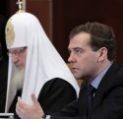As of 2012, religion will be studied in all Russian schools
 After "successful" trial year, Ministry of Education and the Moscow Patriarchate announce the introduction of "Fundamentals of religious culture and ethics" across national territory.
After "successful" trial year, Ministry of Education and the Moscow Patriarchate announce the introduction of "Fundamentals of religious culture and ethics" across national territory.
Moscow (AsiaNews) - After a trial year, "Foundations of religious culture and ethics" will be taught in all Russian schools throughout the country next year, the Russian Ministry of Education announced at a press conference held on March 23 in Moscow with representatives of the four major religions. According to authorities and religious leaders, especially from the Russian Orthodox Church, the trial year was a "success", but nobody was able to respond to journalists questions with exact figures on the course participants and the degree of satisfaction.
"A large number of students chose courses on religion - said Archpriest Vsevolod Chaplin, chairman of the Department for the Church's relations with society at the Patriarchate of Moscow - and this did not cause any inter-religious conflict, but instead we notice a change in the morale among the children who attend them".
Banned during the Soviet era, religion made a comeback in schools in April 2010, but only in some regions, with an initiative strongly supported by the Patriarch of Moscow and blessed by the Kremlin, which aims to a cement national identity on shared values . Students of primary and secondary schools may choose to study between the history of one of the four traditional religions - Orthodox Christianity, Islam, Judaism and Buddhism - or more general courses on "foundations of religious culture" or "fundamentals of public ethics" . So far the lessons were held for only one semester of the school year, but the Orthodox Church has asked that in2012 they be extended over the year.
Elena Romanova who heads the Ministry of Education office for the teaching of religion, explained that the problems still remain, one regarding textbooks, they are "prepared with too much haste", and teachers, who need a" further training".
For the Moscow Patriarchate the matter is literally one of life or death. Chaplin explained the usefulness of religion courses in schools, the fact that if a real "moral revolution" does not take place in Russia, "the country will not survive for much longer". "Moral education does not only instill information - he said - if a young person grows stronger from the moral point of view in an environment devoid of morals, there are chances that he or she can at least partially change things. Only in this way, generation after generation, will we overcome the morally abnormal mentality of our post-Soviet era society. "
The study of religion in schools raises many perplexities among minority faiths who believe the project a Kremlin attempt to affirm Orthodoxy as the key pillar of national identity.
Source: directionstoorthodoxy.org

